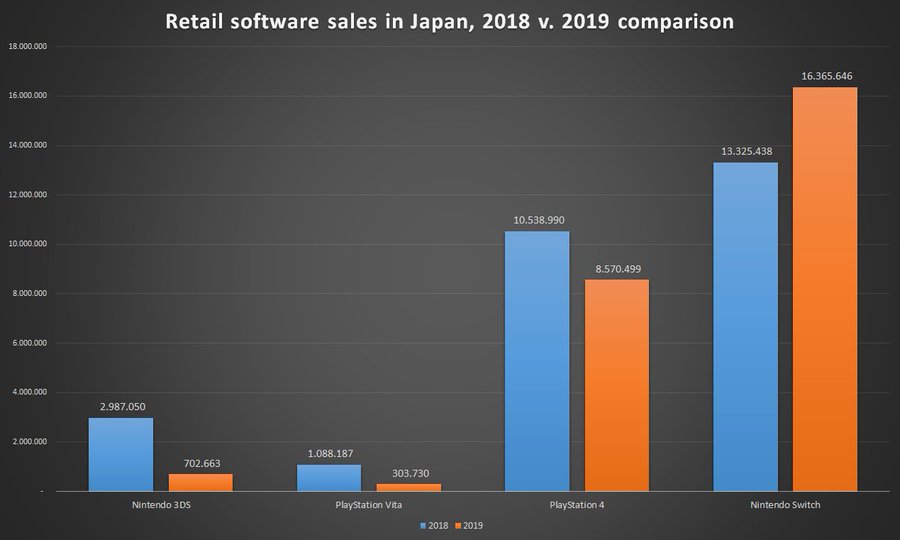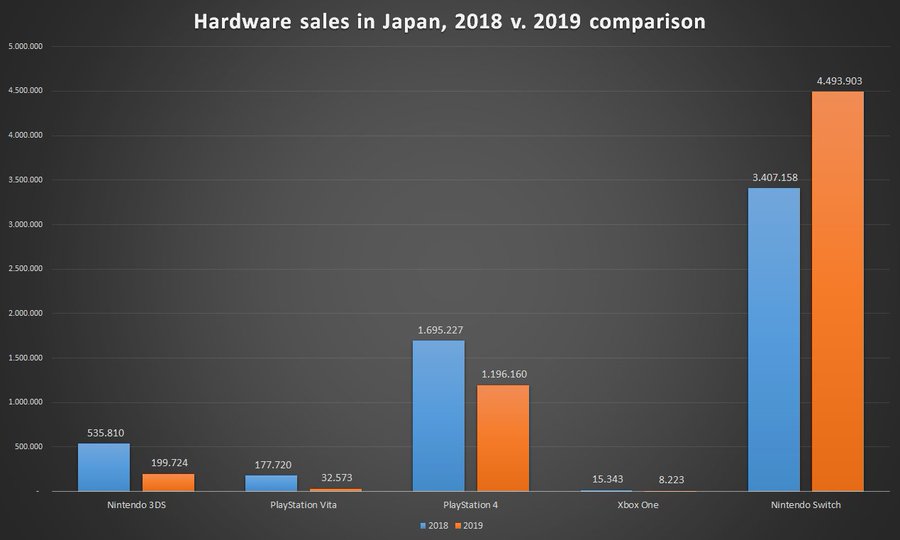
In the US and Europe there are market research
firms that release a monthly report about how the industry is doing, hardware
and software sales, these are the NPD Group and the Gfk. As they are the only
companies to do that business in those areas their numbers are, for the most
part, not revealed to the public, that of course isn't an issue in Japan where
we have 3 trackers that release data on a weekly basis.
Due to that all the information on this blog
post is freely available on the website (as well as other corners of the
internet) for anyone to use so if you want to check the data yourself go to
Game Data Library, where all the data is listed.
That's that for the introduction, this post
will have similar information that the GSD and NPD Group makes public monthly:
bestselling games, best-selling hardware, software and hardware moved as well
as any more relevant information, note that for sales data we'll use the one
that's officially released while for revenue it'll be estimations.
For all intents and purposes, the period we're
calling November and December was from November 4th to December 29th
(8 weeks)
Due to time constrains the reports for November
and December, which encompasses the main holiday season, were combined into a
single large report. As usual it was the biggest and busiest period of the year
as we saw the best-selling game of the year release as well as very strong
lasting sales of older games and some brand-new games.
- Hardware: Over 58 billion yen in revenue came from hardware, with 23 billion being November and 35 billion December, the latter was the biggest month of the year for hardware sales as sales of Nintendo Switch were driven by strong games reaching very high numbers as well as a new price promotion kept the PS4 relatively competitive as the system is reaching saturation on its current price point.
- Software: Over 41 billion yen in revenue came from software, with 22 billion being from November and 19 billion from December, sales on December where unusually low as it was mostly driven by old software as the only notable release that month underperformed, and overall sales for PS4 software, a big revenue driver due to it’s expensive games, were disappointing.
Software
The best-selling games of October 2019 were:
- [PS4] Pokémon Sword / Shield – 2.988.134 (Over 18.26 billion in revenue)
- [SWI] Luigi’s Mansion 3 – 355.349 (Over 2.1 billion in revenue)
- [PS4] RingFit Adventure – 311.954 (Over 2.6 billion in revenue)
- [SWI] Death Stranding – 262.827 (Around 1.9 billion in revenue)
- [SWI] Mario & Sonic at the Olympic Games Tokyo 2020 – 175.690 (Over 1 billion in revenue)
- [SWI] Shin Sakura Wars – 161.288 (Over 1.5 billion in revenue)
- [PS4] Minecraft: Nintendo Switch Edition – 158.737 (Over 550 million in revenue)
- [SWI] Mario Kart 8 Deluxe – 147.447 (Around 820 million in revenue)
- [PS4] Super Smash Bros. Ultimate – 135.747 (Over 920 million in revenue)
- [SWI] Fishing Spirits: Nintendo Switch Version – 128.403 (Around 700 million in revenue)
Launch week sales alone made Pokémon Sword /
Shield the best-selling game of the year, with overall sales just barely
missing 3 million. Performance the game were very interesting as Pokémon was
mostly in decline during the 3DS years with both X / Y and Sun / Moon each becoming
the worst selling game in the series, aside from that this game was also
another entry of Nintendo’s Voucher program, so it was interesting to see how
retail sales would be affected, mainly as digital for the older Pokémon games
was almost nonexistent.
While certain Switch games have done better
than their 3DS equivalents, that’s not the case for all, as launches aligned,
the Nintendo 3DS is the more successful system, both hardware and software
wise, so it’s not expected for all Switch games to do better than what they did
on 3DS. Having said that, as far as we know, including digital, Pokémon Sword /
Shield already outsold Sun / Moon and potentially X / Y, The Pokémon Company
mentioned a 2m launch in Japan, which would mean it sold over 600k digital on
launch week alone, making it the biggest digital, 1m at digital seems very
likely. Even if Nintendo doesn’t keep up with their voucher program it’s likely
they pushed a huge amount of people to digital. It’s also been announced that
there won’t be a third version of the game, but instead large DLC expansions making
the games continue to sell on the long run, unlike the aforementioned games. 5
million is not out of the question for Sword / Shield.
The comparison about Switch and 3DS has been
brought up multiple times, and I also mentioned it back when Luigi’s Mansion 3
had a much softer launch than Luigi’s Mansion: Dark Moon, while the game showed
a very strong holiday performance, and has already sold over 500k units, it’s
still lagging behind Dark Moon, and from what we could see on the eShop
rankings, digital performance for that game isn’t quite as strong. Luigi’s
Mansion 3 was pushed for the holidays, so we’ll have to wait and see how it’ll
perform once they end.
On the sleeper hits of the year we have RingFit
Adventure, which had a strong holiday showing despite having stock issues for
three months now, that game has also sold over 500k units and should sell well
into 2020, unlikely Luigi’s Mansion 3 we know that demand for that game has not
been met, there’s very much potential for a million seller there. Another game
that’s likely pushed by the holidays was the new Mario & Sonic title, which
recovered from it’s weak launch and has already outsold all entries on 3DS and
Wii U, this is a game that’s likely to quietly sell for 2020 until the Olympics
begin, it may not sell as much as it did on Wii and NDS but it’s a recovery and
also SEGA’s third best selling game of the generation with plenty of potential
still. The last sleeper hit was Bamco’s Fishing Spirits, the game is having the
strongest performance for a Bamco game on Switch and it’s on track of
outselling Taiko on the platform, there’s a good chance it may become Bamco’s
best selling game this gen in Japan.
The other two noteworthy releases for the month
were both PS4 exclusives, with Hideo Kojima’s first new game since his
departure from Konami and a revival of an old beloved IP from SEGA. Performance
for the games is hard to tell, but neither perform well above or below what was
expected and it’s hard to see what the publishers wanted. Death Stranding had a
much weaker launch than any Kojima led Metal Gear title yet at the same time it
was the biggest new IP launch since Freedom Wars on PSV, more impressive as
Death Stranding isn’t a conventional game. Shin Sakura Wars on the other hand
is a revival of an IP that hasn’t been popular for 20 years and is changing
genres from SRPG to an action RPG; it went on to have a decent launch, better
than the last game in the series (considered a failure and the reason why the
series was iced for over a decade) but worse than any other. Launch results
were considered positive, but legs for the game were extremely weak and after a
month on sale it hasn’t been able to reach launch sales of the other games.
It’s interesting as to what SEGA was expecting for this game as it’s not just a
new game but an IP relaunch as there’s going to be a new Sakura Wars anime
releasing in 2020 and the new game will be released internationally, so it may
be enough to get the ball rolling again at least.
The bestselling games of 2019 were:
- [PS4] Pokémon Sword / Shield – 2.988.134 (Over 18.26 billion in revenue)
- [SWI] Super Smash Bros. Ultimate – 1.092.397 (Over 7.2 billion in revenue)
- [PS4] Kingdom Hearts III – 861.226 (Over 6.83 billion in revenue)
- [SWI] Super Mario Maker 2 – 800.504 (Over 4.7 billion yen in revenue)
- [SWI] New Super Mario Bros. U Deluxe – 745.971 (Over 4.3 billion in revenue)
- [SWI] Mario Kart 8 Deluxe – 628.812 (Over 3.5 billion in revenue)
- [SWI] Minecraft: Nintendo Switch Edition – 620.903 (Over 2.1 billion in revenue)
- [SWI] Luigi’s Mansion 3 – 505.998 (Over 3.1 billion in revenue)
- [SWI] Super Mario Party – 497.862 (Over 2.7 billion in revenue)
- [PS4] RingFit Adventure – 495.639 (Over 4.1 billion in revenue)
More than 7 million games were sold for
November and December with the former seeing a big increase over last November
and the latter being a big decrease over last December. As with the rest of the
year Nintendo Switch represented the lion share of software sales as due to the
launch of the new Pokémon titles and as the holidays were driven by Nintendo
Switch games, in contrast sales of PlayStation 4 software were very soft, with
less than 600k games sold in December and selling a bit over 1.2m for the
holidays, it being the weakest holiday for PS4 since 2014.

The Pokémon Company was the top publisher in
the holidays, selling over 3.1 million games, breaking Nintendo’s 11-month
streak, that 3.1m were enough for TPC to be the 2nd biggest publisher
of the year. Even at their low Nintendo was the 2nd biggest
publisher, selling over 1.6 million games, Nintendo was the biggest publisher
for 2019 selling more than 7 million games, more than twice than the 2nd
biggest. Bandai Namco, SEGA and Sony were the other big publishers for the end
of 2019 selling 400k, 360k and 340k games sold respectively.
Hardware
For 22 months Nintendo Switch has been the best
selling hardware in Japan, in 2019 the system saw it’s strongest holiday yet,
selling around 1.6m units and crossing the 10m and 11m milestones, the system
should remain on top for at least another 12 months as Animal Crossing releases
on March, the system is also yet to see a price drop and there may be more new
SKUs on the way, Switch also ends the year selling more than 1m than what it
did on 2018, it’s hard to say if 2019 was the system’s peak year.
As were expecting in previous months there was
another holiday campaign for PS4, as the price for all SKUs was cut by 10.000
yen, a pretty substantial cut, this put the base 500BG PS4 at the same price as
the Nintendo Switch Lite, demand at this price was so high that there were
stock issues of the system within the first week of the promotion (which
started on December 16th), about 20% of all PS4 systems sold in Japan this year
were sold in December. It does seem as if the price cut somehow affected
software sales, as despite strong hardware sales, performance of games were
quite low during the campaign, chances are plenty bought used games or went for
digital sales.



No hay comentarios:
Publicar un comentario